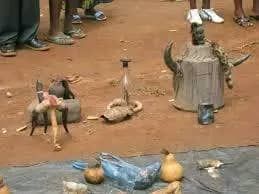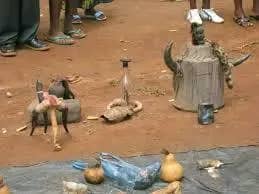By Twink Jones Gadama
In the rural village of Katola in Lilongwe, Malawi, a disturbing incident unfolded on Thursday, February 15, 2024. Two elderly individuals, aged between 71 and 85, found themselves at the mercy of an angry mob, accused of practicing witchcraft. The villagers, fueled by superstition and fear, believed that these individuals were responsible for bewitching a young girl in the community.
The situation escalated quickly, with the mob ready to take matters into their own hands and deliver what they believed to be justice. It was only thanks to the timely intervention of the police at Lumbadzi that the two elderly individuals were rescued from the brink of violence.
Sergeant Felix Kwinyani, Public Relations officer at Lumbadzi Police Station, recounted the harrowing events that transpired in Katola village that day. The accused individuals, already vulnerable due to their advanced age, faced the threat of being physically harmed or even killed by their own neighbors. The accusations of witchcraft, though unfounded, struck fear into the hearts of the villagers, driving them to seek retribution without any evidence or trial.

Despite the intervention of the police, no arrests have been made in connection to the incident. However, Kwinyani reassured the community that investigations are underway to identify and hold accountable those responsible for inciting violence against the elderly individuals.
This incident sheds light on a disturbing trend in Malawi, where accusations of witchcraft continue to fuel violence and discrimination against vulnerable members of society. The belief in witchcraft is deeply ingrained in many communities, leading to the scapegoating of individuals, particularly the elderly, who are perceived as different or threatening.
The consequences of such accusations can be dire, as seen in the case of the two elderly individuals in Katola village. Not only do they face physical harm and ostracization from their community, but they also endure the psychological trauma of being labeled as witches, a stigma that can have lasting effects on their well-being.
The Malawi government has taken steps to address the issue of witchcraft accusations, with laws in place to protect individuals from being falsely accused. However, the enforcement of these laws remains a challenge, as deep-rooted beliefs and social norms often perpetuate the practice of witch-hunting.
It is crucial for community leaders, including chiefs, to play a role in educating their constituents and promoting tolerance and understanding. Witchcraft accusations not only harm individuals but also tear at the fabric of society, creating fear and division where there should be unity and cooperation.
As we reflect on the events that unfolded in Katola village, it is a stark reminder of the dangers of superstition and misinformation. We must strive to create a society where all individuals, regardless of age or background, are treated with dignity and respect, free from the specter of witchcraft accusations and violence.
The two elderly individuals rescued by the police in Lilongwe serve as a reminder of the importance of standing up against injustice and prejudice. They may have escaped physical harm on that fateful day, but their ordeal serves as a sobering reminder of the challenges that many vulnerable individuals face in our communities.
As we move forward, let us work towards a future where accusations of witchcraft are met with skepticism and compassion, rather than violence and fear. The safety and well-being of our elderly population, and indeed all members of society, depend on our ability to reject harmful superstitions and embrace a more inclusive and tolerant worldview.



